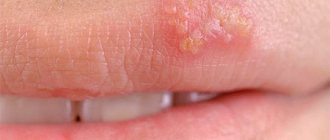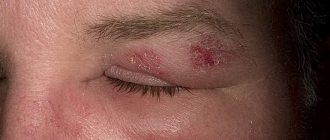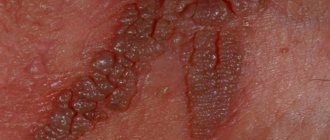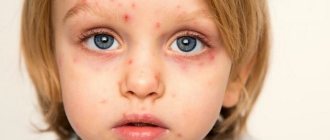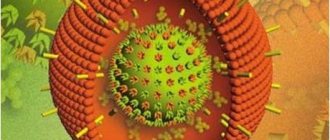Herpes on the labia is an exclusively female disease that occurs between the ages of 20-35 years.
The causative agent is herpes virus type 2. It is not resistant enough to negative factors of external conditions, and is always present in the human body, once penetrating the nervous system through infection.
Infectious pathology is dangerous because it easily spreads from the external genital organs to the internal ones, affecting the uterus and appendages.
Features of genital herpes
There are several types of virus. Previously it was claimed that infection on the lips is caused by HSV-1, and on the genitals by HSV-2.
Then it was found that both one and the second herpes virus are capable of infecting both lips and genitals. The only difference is that most often (about 80%) infection on the labia is caused by HSV-2, and less often (the remaining 20%) by type 1 virus.
The virus is transmitted sexually. It is unstable in external conditions and dies instantly (after a few minutes) under the influence of cold, heat and other factors.
Of course, there is also a household route of infection (using someone else’s towel and other common hygiene items), but this is rarely observed. To eliminate household transmission, it is enough to follow simple hygiene rules.
What it is?
Genital herpes is a viral inflammatory disease that appears on the labia of women and the penis of men. The pathology lasts a long time with possible exacerbations and long-term remissions, and can also spread to the anus (anal herpes).
The virus, having entered the human body, lives there permanently. This means that it is impossible to destroy it, you can only silence it for a while. With a strong immune system, the pathogen may not express itself in any way. When herpes occurs in a pregnant woman, it can adversely affect the fetus. Intrauterine defects and diseases were noticed, and fetal death occurred.
Many women are embarrassed to go to the doctor with herpes on the genitals and use traditional methods of eliminating the disease. But incorrect measures can cause complications and lead to re-exacerbation. Therefore, it is advisable to immediately contact a specialist and follow all his instructions.
The effect of the virus on the cell
Causes
Factors of genital herpes include sexually transmitted infection or worsening relapse. However, symptoms do not appear immediately. When the human body weakens, colds on the genitals come to life with greater force.
The causes of genital herpes are:
- Physical activity – due to fatigue and weakness, the intensity of the immune system noticeably decreases, as a result of which it is difficult for the body to fight infectious pathogens.
- Stress and mental disorders - an unstable emotional state leads to disruption of the functioning of the central nervous system, which significantly reduces the body's defenses. Then the herpes virus progresses even more.
- Poor nutrition – in order to create stable immunity, you should consume a significant amount of protein, which will saturate the body with the necessary amino acids. When dieting for weight loss, there is a lack of nutrients, which also negatively affects human health.
- Hypovitaminosis - when the body does not have enough macro- or microelements, it is difficult for it to cope with infection.
The following can increase the infectiousness of the virus:
- failure to maintain intimate hygiene;
- presence of diabetes mellitus;
- microtraumas, damage to the labia;
- chemotherapy or long-term use of certain medications;
- allergic reactions to underwear, pads;
- promiscuous relationships with different partners;
- chronic vulvitis of a different origin.
Such factors cause the formation of a virus. The disease sometimes occurs due to surgical termination of pregnancy or prolonged use of intrauterine devices. Renewal of genital herpes may occur due to temperature changes (overheating, hypothermia), lack of vitamins (in particular B12), and climate change.
Symptoms
Genital herpes has a primary and recurrent nature. Pathology is expressed only with repeated manifestations. The incubation period lasts from 2 to 20 days. This suggests that from the time the virus enters the human body until the initial signs appear, it can take a couple of days, and sometimes 2-3 weeks. Such changes are caused by the properties of the immune system.
The main symptoms of genital infection are:
- feeling of pain in the lower abdomen;
- redness of external organs;
- blisters filled with fluid that become red and itchy;
- an increase in temperature to 37.5°C is not always observed (usually with a significant lesion);
- burning, itching, swelling and rash on the labia;
- purulent or serous discharge from the vagina with an unpleasant, pungent odor;
- expansion of regional lymph nodes;
- malaise, lethargy, painful state of muscle tone;
- frequent urination;
- changes in the menstrual cycle.
This is the main list of symptoms, others may appear, it all depends on the characteristic signs of the disease. The rash can be single or multiple; it can concentrate not only on the genitals, but also on the buttocks and lower abdomen.
Symptoms are very diverse, for example, lymph nodes do not enlarge in all cases, blisters immediately appear, turning into erosions and ulcers.
Firn m, genital herpes: a disease that is not customary to talk about out loud
We are well aware of such sexually transmitted diseases as AIDS, syphilis, gonorrhea. As for genital herpes, it is usually given a secondary role, but, in fact, it is no less dangerous.
Just like AIDS, herpes cannot be completely cured and, once infected with this virus, a person becomes its carrier for the rest of his life.
Although, unlike HIV infection, the herpes virus itself cannot cause death, nevertheless, neglected genital herpes can lead to an immunodeficiency state and cause cancer of the genital organs.
Genital herpes is a sexually transmitted disease caused by one of the many members of the herpesvirus family. This virus is a close relative of herpes simplex, which causes the well-known “lip fever.”
In terms of its prevalence, this disease ranks second among all sexually transmitted infections. According to experts, approximately every tenth Russian is infected with genital herpes.
Transmission of genital herpes occurs through sexual contact in the vagina, mouth and rectum.
It is most possible to infect a partner during an exacerbation of the disease, however, even in the absence of rashes, the risk of transmitting herpes remains.
In addition, in approximately 80% of patients, genital herpes occurs without visible manifestations. These people do not even know that they are infected, while being the source of infection.
A typical picture of the disease looks like this: bubbles appear in the genital area, which then grow, unite with each other and, bursting, form painful ulcers. In women, the vagina itself and its vestibule, labia and cervix are most often affected. Less commonly, rashes are located on the pubis, thighs, buttocks and perineal area.
Manifestations of genital herpes are very painful. Sometimes a person gets away with an asymptomatic form, but in other cases, ulcers do not allow the patient to walk, sit, or go to the toilet calmly. Some, due to severe pain, cannot even sleep at night; in simple terms, they “climb the wall in pain.”
Psychological experiences are often added to physical suffering: irritability, fear of new rashes, thoughts about the impossibility of having healthy children, fear of infecting a loved one, a feeling of uselessness, loneliness... Suicidal thoughts may even arise.
Genital herpes not only causes physical and mental pain, but also causes weakened immunity, causes chronic diseases of the internal genital organs and can ultimately cause both female and male infertility. Genital herpes is especially dangerous for pregnant women, who may develop pregnancy pathology and become infected with the fetus and newborn.
Treatment
Unfortunately, the herpes virus tends to persist in the body throughout life. And, having declared itself publicly once, the disease can appear again and again. Therefore, we must keep in mind that modern medications can only shorten the duration of the disease and reduce its severity, but cannot “get rid of the virus once and for all.”
Classic drugs for the treatment of genital herpes are acyclic nucleosides (acyclovir, valacyclovir, famciclovir). However, recently an increasing number of viruses resistant to acyclovir (and similar drugs) have appeared.
Therefore, it is recommended to alternate acyclic nucleosides with each other (for example, acyclovir with valacyclovir) or use them together with interferon drugs. Interferon is one of the most powerful antiviral proteins in the body. It recognizes the infectious agent that has entered the cell and prevents its reproduction.
It is believed that it is the lack of interferon in the body that causes relapses of herpes.
It is better to use drugs that simultaneously contain interferon and acyclovir. The only product in the world that contains both acyclovir and interferon is herpferon ointment. Considering the painfulness of genital herpes, lidocaine was also included in the ointment, which provides an analgesic effect.
According to clinical studies, the use of herpferon for genital herpes in 85% of patients led to complete recovery on the 5th day.
This figure was 3.5 times higher than that of the group receiving classical treatment with acyclovir.
In patients who used herpferon, general malaise and headache stopped much earlier, and itching, pain and fever at the site of the rash disappeared faster.
Prevention of recurrent infections
Repeated episodes of genital herpes appear under the influence of factors unfavorable to the immune system. These include: illness, prolonged exposure to the sun, hypothermia, the onset of menstruation, pregnancy, and taking hormonal medications. Herpes can also worsen due to stress.
Therefore, you should not neglect a healthy lifestyle, proper nutrition and taking vitamins. Existing diseases should be detected in time and treated under the supervision of a doctor. You need to avoid prolonged exposure to the sun and hypothermia, and protect yourself from stress. And, of course, maintain intimate hygiene and promptly identify and treat concomitant sexually transmitted diseases.
In any case, if you have rashes characteristic of genital herpes, you should not postpone a visit to a specialist.
Prevention for a healthy person
How to protect yourself from genital herpes? First of all, we must remember that absolutely safe sex does not exist. Even a condom, while greatly reducing the risk of infection, does not provide a complete, one hundred percent guarantee of protection against genital herpes.
A healthy person should avoid “casual” relationships, be sure to use barrier contraception methods, and preferably in combination with emergency prevention measures. After suspected unprotected contacts, it is recommended to conduct an examination to identify genital herpes and other sexually transmitted diseases.
We also must not forget about the rules of hygiene. No wonder everyone has their own personal towel. After all, for example, if you use a towel after a person with genital herpes, you can easily become infected yourself.
It must be borne in mind that during oral contact, herpes from the lips easily spreads to the genitals. Therefore, you need to engage in oral sex using special latex wipes. And when rashes appear on the face and lips, you should abstain from this pleasure altogether.
There may be cases of self-infection with genital herpes, when the virus is transferred from the lips by dirty hands to the genitals. And here again the banal rules of personal hygiene come to our rescue. Thorough hand washing (especially during the onset of fever on the lips), having separate towels for the face, hands and body will protect you from such trouble.
Emergency prevention
The use of barrier contraceptives, especially during an exacerbation of genital herpes, does not exclude the possibility of infection.
Therefore, after suspicious sexual contact or contact with a carrier of the herpes virus, in addition to a condom, special means should be used for emergency prevention of the disease. One of these drugs is the drug herpferon.
If you use herpferon ointment within 1-2 hours after intimacy, the likelihood of avoiding infection with genital herpes will increase significantly.
Source: https://firnm.ru/article/genital-herpes/
Methods of infection
The genital virus is transmitted through sexual contact. However, the pathogen can enter the body not only through simple vaginal intercourse, but also through oral and anal sex.
Even when a partner does not show obvious signs of herpes, infection is still possible.
If the virus is in a man, then the risk of infection is 18-20%. Using condoms or other contraceptives, the probability decreases by 3 times. Therefore, the virus appears due to unprotected contacts and disordered intimate life.
Reasons for appearance

Moreover, you can become infected through protected sexual contact as well. Cases of household transmission of genital herpes are rare. But experts do not rule out this possibility, so they strongly recommend following basic hygiene rules. If a woman already has the herpes virus in her body, it can become active for the following reasons:
- prolonged stress;
- weakened immune system;
- excess or deficiency of vitamins in the body;
- improper dieting;
- frequent colds;
- promiscuity;
- unprotected sexual contacts.
In addition, abortion or pregnancy, as well as prolonged use of an intrauterine device, can trigger the activation of herpes.
Treatment
It must be remembered that the virus focuses on nerve cells and lives there forever.
Treatment will be aimed at:
- elimination of disease symptoms;
- reducing the duration of an exacerbation;
- reduction in viral tension - the number of pathogens in the body;
- resumption of functions suppressed during pathology;
- prevention of bacterial aggravations;
- acquisition of laboratory, clinical remission.
It is very difficult to treat a female infection. The basis of treatment is medications.
Drug therapy
Preparations for the treatment of genital herpes include various tablets, injections, ointments, and gels for external use.
The following medications will help relieve symptoms and alleviate a woman’s condition:
- Antiviral drugs (Valacyclovir, Acyclovir, Zovirax) are effective against different types of herpes. Since these drugs are from the same group, their side effects and contraindications are the same. It makes no sense to cure genital herpes without antiviral drugs. The course of treatment is no more than 10 days.
- Local preparations (Oxolinic ointment, Epigen, Panthenol) - have an analgesic and anti-inflammatory effect, help get rid of itching and burning. Ointments and gels increase the process of regeneration of the skin and mucous membranes. Local therapy does not lead to side effects, but can provoke an allergic reaction. It is necessary to carefully monitor the skin in the area of application.
- Immunomodulators (Imudon, Tonsilgon, Poludan) - the appearance of genital herpes already indicates a weakened immune system. Immunomodulators can help restore the body's defenses. They affect the process of separation of leukocytes and the speed of formation of antiviral antibodies. They have side effects and contraindications. They should be used after the appointment of a specialist. These medications are used only along with antiviral drugs.
- Vitamin and mineral complexes (Vitrum, Complivit, Centrum) are designed to strengthen the immune system.
The main therapy is antiviral medications; taking them at the initial stage of herpes development helps to completely eliminate unpleasant symptoms. Other methods are used in complicated situations.
Video from an expert:
Traditional methods
For external treatment of herpes on the labia, you can use folk recipes. They are made at home and help reduce pain and speed up the healing process.
The most effective recipes are:
- Kalanchoe juice perfectly inactivates the virus and dries out wounds; You will need fresh leaves (the plant must be at least 3 years old), finely chop; Treat pathological areas 6-7 times a day;
- Pour 20 g of propolis into half a liter of vodka, leave for 3 days, use four times a day; then it is advisable to coat the woman’s genitals with chamomile cream;
- baths with the addition of geranium, lemon, eucalyptus oils; drop 7-8 drops into water. means and stay in it for about 15-20 minutes;
- A mixture is prepared from birch buds, 1 tsp. put the product and 1 glass of milk on the fire for 5 minutes, strain, dip the swab and insert for 30 minutes. in the middle of the vagina.
Doctors advise eating more different cereals, proteins, and fruits.
How to treat herpes on the labia
Genital herpes can only be eliminated with an integrated approach to the problem. Since the disease has a viral etiology, it is necessary to understand that it will not be possible to get rid of it forever, but it is possible to transfer the pathogen to a dormant state. Treatment is carried out only after diagnosis (more details here). Therapy includes products for external and internal use, as well as folk recipes.
What else to read: Causes and treatment of herpes on the buttocks (buttocks, tailbone)
Diagnostics
Diagnosis of genital herpes involves a blood test for antibodies to this type of viral infection.
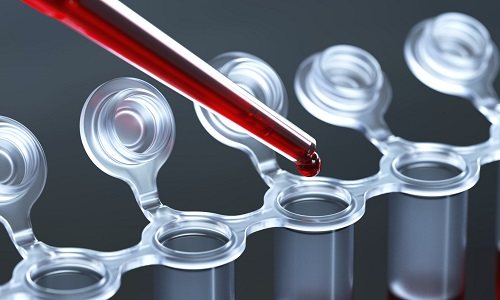
Diagnosis of genital herpes involves a blood test for antibodies to this type of viral infection.
Additionally, PCR is prescribed, which allows you to identify the pathogen by the presence of a specific DNA structure. Herpes infection is detected in women by analyzing vaginal discharge.
Prevention
Simple rules will help protect a woman from the appearance of genital herpes.
To do this you need:
- use contraception, condoms;
- eat a balanced diet;
- strengthen the immune system using various methods, use multivitamins;
- follow the rules of intimate hygiene;
- do not wear an intrauterine device for a long time;
- monitor your psycho-emotional state;
- do not overcool;
- strengthen your body: walk in the fresh air, lead an active lifestyle;
- do not overwork and follow the necessary sleep schedule (at least 8 hours) and, if possible, rest during the day.
In case of the first manifestations of the disease, be sure to consult a specialist, follow all his instructions, and use comprehensive treatment.
Video from Dr. Malysheva:
Transmission path
Genital herpes occurs during unprotected intimacy with a sick person. You can become infected through classic sex, anal sex, or oral sex. If the sick partner also has a classic picture of the disease, then the risk of infection increases tenfold. But this is not the worst thing; the most dangerous are virus carriers who do not have an obvious clinical picture, but constantly infect their sexual partners. There are cases when herpes on the labia in women occurs due to their own carelessness. This is quite simple to explain; an example of this is labial herpes; if personal hygiene is not observed, there is a possibility of introducing viruses to the genital area.
The reasons why women develop herpes on the labia may be as follows:
- Traumatization;
- Frequent stressful situations;
- Reduced protective properties of the immune system;
- Insufficient time for rest;
- Abortion;
- Frequent change of sexual partners;
- Unprotected sex;
- Chronic diseases;
- Diseases of the endocrine system;
- Hypothermia or overheating.
Dangers during childbirth and pregnancy
Often, infection with the virus causes miscarriage or undeveloped pregnancy. Pathology can lead to infertility when adhesions and inflammatory processes form in the pelvic organs.
The virus passes from the mother during childbirth to the baby. The situation becomes more complicated if the woman has a fresh rash during this period. In this case, dangerous damage to the child’s organs and death may occur.
If the pathology is in an acute stage, the newborn becomes infected at the time of birth. It is important to carry out treatment in a timely manner, because the infection affects the labia, perineum, and vagina. If left untreated, it will easily spread to the uterus and lead to infertility.
What should women do during pregnancy?

Treatment tactics depend on the trimester of pregnancy.
1st trimester:
- intravenous administration of antiviral drugs;
- course of human immunoglobulin;
- treatment of rashes with aniline dyes.
2nd trimester:
- drip administration of Panavir or Acyclovir;
- suppositories with Viferon, immunotherapy with human immunoglobulin;
- local use of Acyclovir.
3rd trimester:
- 3 weeks of drip administration of Panavir or Acyclovir;
- candles with Viferon;
- use antiviral ointment every 2-3 hours.
The use of local drugs is completely safe - they are not absorbed into the mother’s blood and therefore do not affect the fetus.
Complications
An effectively treated disease usually does not lead to adverse consequences. Worsening may occur when a woman ignores this problem.
Then the following is possible:
- the infection begins to spread throughout the body, the inflammatory process can reach the brain;
- the likelihood of infecting a sexual partner increases;
- if the rash develops in the urinary system, there may be urinary incontinence;
- depression and psychoemotional disorders;
- discharge with blood may indicate the presence of erosion or neoplasm of the cervix (the risk increases when the papilloma virus is present along with herpes).
You should not delay treatment, since it is easier to cure a disease at an early stage than at an advanced stage. Preventive measures make it possible to live without any serious manifestations of genital herpes. The disease adversely affects the quality of life of the female half of the population, therefore, when the first signs of infection appear, you should urgently contact a gynecologist or venereologist.
Genital herpes
Some treatments are still in development or simply have not undergone all the necessary trials. Today, the most promising method of treating herpes is gene therapy. According to research, the use of CRISPR technology for genome editing will make it possible in the future to completely remove the virus from the body of patients.
There are also alternative medications, the effectiveness of which has only been proven in isolated studies. These are lysine-based nutritional supplements, as well as ointments containing zinc oxide, aloe vera extract and propolis.
The use of such agents helps eliminate the inflammatory process and accelerate tissue regeneration. The use of any additional medications in the treatment of herpes should be discussed with your doctor first.
Complications
The negative consequences of genital herpes in most cases develop in the acute form of the disease. Patients with reduced immunity and other infectious pathologies are at risk.
Possible complications
- Invasion of other infectious agents into the body. The presence of ulcers and erosions in the area of the external genitalia facilitates the penetration of pathogens into the patient’s body. For example, the risk of contracting HIV increases significantly.
- Infection of tissues and organs of a newborn with the subsequent development of a systemic disease characterized by high mortality.
- Damage to the urinary system. Viruses can cause inflammation in the mucous membranes of the urethra and bladder. Severe swelling of the urethra can make it difficult to pass urine.
- Meningitis is an inflammation of the lining of the brain and spinal cord. The inflammatory process can also spread directly to brain tissue.
- Inflammation of the rectal mucosa (proctitis). Damage to this anatomical area is possible during unprotected anal sex.
- Transfer of infection to other areas of the body, including the face.
- The growth of a malignant tumor in the cervix. Tissue ulceration can provoke precancerous changes.
The use of antiviral drugs not only alleviates the symptoms of the disease, but also prevents the development of complications. If you notice symptoms of brain damage due to herpes, you should immediately consult a doctor.
Forecast
Even after the use of modern antiviral agents, viral DNA remains in the nuclei of nerve cells. In this case, the disease becomes latent because viral replication stops. It is impossible to prevent the persistence of the herpes pathogen in the body, but drug therapy can reduce the risk of reactivation of the pathogen.
The first relapse of the disease can occur within a year after infection. The development of characteristic symptoms is preceded by a prodromal period, manifested by burning of the mucous membrane of the genital organs and impaired sensitivity of the skin in the sacrolumbar region. At this stage, it is recommended to begin antiviral therapy to shorten the duration of relapse.
On average, patients experience 2 to 5 relapses annually. The exact reasons for reactivation are unknown. It is assumed that an exacerbation of the infection may occur due to a cold, hypothermia, menstruation or severe stress. In this case, the main mechanism of relapse is a general and local decrease in immunity.
The incidence of complications has not been sufficiently studied. Brain damage most often occurs in newborns and patients with reduced immunity. Since the most dangerous complications occur during primary infection, it is important to diagnose the disease in time and use antiviral agents.
